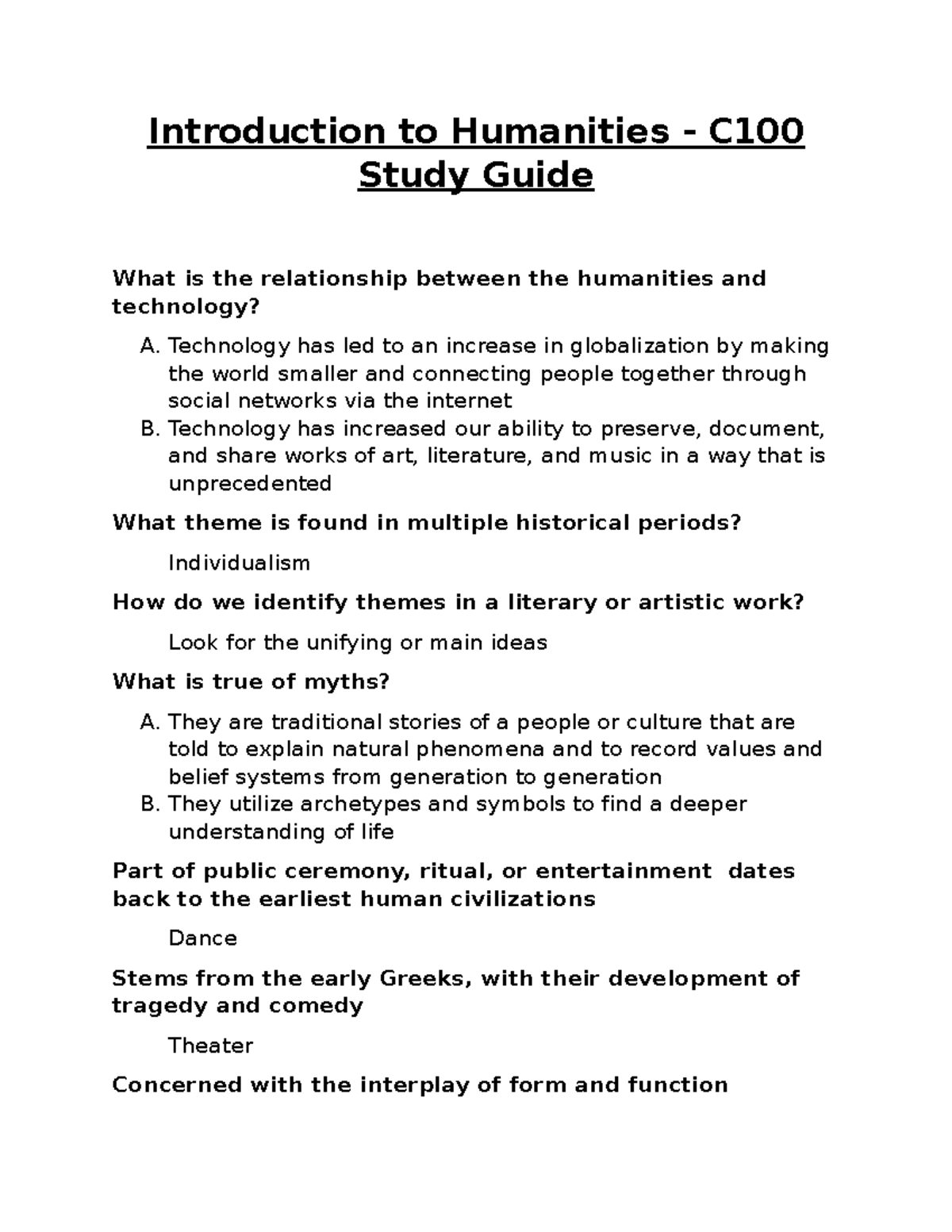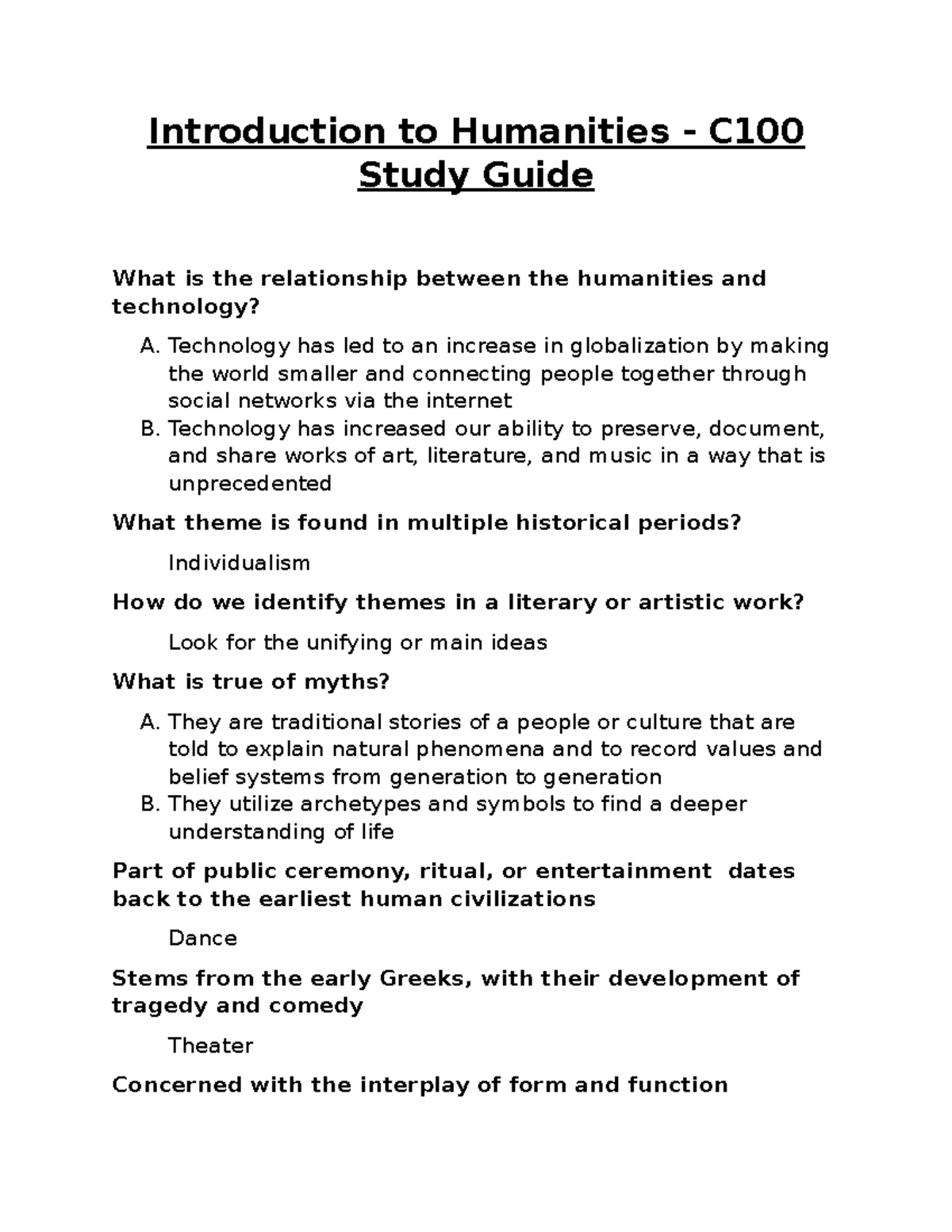Introductory humanities courses are pivotal for first-year students embarking on their educational journey. These courses are designed to ignite a passion for the arts and humanities, offering a fresh perspective on vital cultural and philosophical questions. As enrollment in humanities programs declines nationwide, innovative curriculums aim to engage students more effectively, emphasizing the intrinsic value of humanities education. From exploring literature to understanding the complexities of human culture, introductory arts courses shape the foundational skills necessary for critical thinking and creative expression. By embracing a new humanities curriculum, institutions can revitalize interest and inspire a deeper appreciation for the disciplines that define our shared human experience.
The launch of first-year humanities courses represents a transformative moment in higher education, engaging students with the core aspects of arts and cultural studies. These early courses not only introduce essential themes in the humanities but also serve as gateways to broader intellectual pursuits. By fostering an environment where learners can connect with various artistic expressions and philosophical ideas, new humanities programs are redefining educational pathways. This fresh approach encourages students to appreciate the importance of engaging humanities and their impact on personal and societal development. As a result, this renaissance in humanities education seeks to cultivate a generation of thoughtful and culturally aware individuals who value the richness of human narratives.
The Importance of Introductory Humanities Courses
Introductory humanities courses serve as the gateway for students eager to explore the intricate tapestry of human culture and expression. These foundational classes are designed to cultivate critical thinking, creativity, and empathy, equipping first-year students with essential skills that transcend academic walls. By engaging with significant texts and artistic mediums, students develop a deeper understanding of diverse perspectives and human experiences. Such exposure is especially crucial in a world increasingly driven by technological advancement, where the humanities remind us of the values and questions that define our existence.
Furthermore, these courses are pivotal in addressing the declining enrollment in humanities disciplines. Educators, like Dean Sean Kelly, acknowledge that many students enter college with a fleeting interest in the arts and humanities. However, the way introductory courses have traditionally been taught did not resonate with many students. By reimagining these courses to be more relevant and engaging, universities hope to rekindle interest and demonstrate how the humanities can illuminate their academic journeys and personal lives.
Reimagining the First-Year Humanities Experience
In response to the challenges faced by humanities programs, innovative approaches have emerged, making first-year humanities courses more engaging and accessible. Institutions are introducing new curricula that replace antiquated methods of teaching with dynamic frameworks focused on student interests and contemporary issues. Courses like ‘Culture in Context’ and ‘Humanity, Technology, and Creation’ aim to connect with today’s socially conscious students, enabling them to see the relevance of humanities in understanding current events and personal challenges.
These innovative introductory courses not only cover traditional texts but also integrate diverse media and interdisciplinary studies. By examining the nexus of art, technology, and culture, students are encouraged to question and explore the significance of human creativity and thought. In doing so, they develop analytical skills that are crucial for any field, thus reinforcing the role of humanities education in shaping well-rounded individuals.
Engaging Students with New Humanities Curriculum
The shift towards a new humanities curriculum highlights the importance of engaging students through interactive learning experiences. Courses designed with hands-on components, such as collaborative projects and discussions that incorporate personal narratives, foster a sense of ownership over the learning process. By encouraging first-year students to express their perspectives and relate course materials to their experiences, educators enhance students’ emotional and intellectual connections to the content.
Moreover, by showcasing contemporary works alongside traditional classics, the new curriculum broadens student exposure to a variety of voices and contexts. This diversity not only enriches students’ learning but also promotes a more inclusive understanding of what constitutes significant contributions to the arts and humanities. Engaging students in an exploration of both historical and modern texts prepares them for thoughtful citizenship in a pluralistic society, emphasizing the relevance of the humanities in their everyday lives.
The Role of Faculty in Shaping Engaging Humanities Courses
The commitment of faculty members in evolving introductory humanities courses cannot be overstated. Educators like Professor Moira Weigel and Karen Thornber exemplify this dedication by designing courses that are not only informative but also personally resonant for students. Their approach involves tapping into current societal issues, making the humanities more relevant to first-year students’ lives. By fostering stimulating discussions, faculty members encourage students to engage deeply with the material, thus enhancing their educational experience.
Faculty members who prioritize the development of the humanities as a vibrant and engaging field can significantly impact student enrollment and retention in arts-related disciplines. By inspiring curiosity and critical analysis, these educators play a vital role in not just teaching, but in influencing future scholars and practitioners in the arts and humanities. Their passion ignites student interest, ensuring that the humanities remain a vital area of study for generations to come.
The Impact of Interdisciplinary Learning in Humanities
Integrating interdisciplinary learning into humanities courses enriches students’ educational experiences and broadens their understanding of complex issues. By combining approaches from history, literature, philosophy, and the arts, first-year students are encouraged to think critically about how these disciplines interconnect. This holistic view fosters deeper insights into the multifaceted nature of human society and culture, equipping students with the tools needed to navigate and contribute to an increasingly complex world.
Moreover, interdisciplinary courses challenge students to draw connections between seemingly disparate fields, fostering creativity and innovation. For instance, exploring themes such as migration and cultural identity through various artistic lenses allows students to appreciate the richness of human experience. Such an approach not only enhances critical thinking but also prepares students to address contemporary global challenges, emphasizing the ongoing relevance of humanities education.
Engaging with Great Literature in First-Year Courses
One of the goals of introductory humanities courses is to engage students with great literature that speaks to timeless human experiences. By immersing first-year students in classic and contemporary works, educators aim to spark discussions about fundamental questions of existence, ethics, and identity. Engaging with literature opens pathways for students to explore their emotions and thoughts, further developing their analytical skills.
Understanding great literary works extends beyond mere textual analysis; it invites students to empathize with characters and narratives that reflect real-world issues. This engagement not only cultivates a love for reading but also enhances students’ ability to articulate their thoughts and express their perspectives. As Dean Kelly emphasizes, reading literature is central to the humanities project, giving students the tools to reflect on what it means to be human.
The Future of Arts and Humanities Education
The future of arts and humanities education relies on continual adaptation and innovation in course design and delivery. As the academic landscape evolves, it becomes increasingly vital for programs to remain relevant to changing student demographics and interests. By incorporating feedback from students and faculty alike, educators can ensure that introductory courses resonate with the needs of the first-year population, bridging the gap between traditional humanities education and contemporary societal issues.
Moreover, as technology advances, hybrid models of teaching that combine in-person and online learning may play a significant role in shaping the future of humanities education. Embracing these new formats can enhance accessibility and allow for more diverse teaching methods that cater to different student learning styles. Ultimately, the aim is to create an engaging and dynamic environment where students not only learn about the humanities but also understand its transformative power in both their academic and personal lives.
Cultivating a Lasting Interest in the Humanities
Cultivating a lasting interest in the humanities among first-year students is essential for sustaining these vital academic disciplines. Engaging courses should encourage students to explore their passions and curiosities, laying the foundation for lifelong learning and reflective thinking. The key is to showcase the value of the humanities in navigating complex moral questions, societal challenges, and personal development, making it clear to students that these studies offer essential insights into what it means to be human.
By emphasizing the intrinsic value of humanities education rather than its instrumental uses, educators can foster a deeper appreciation for the arts and humanities. Activities such as collaborative discussions, diverse reading lists, and participatory projects should be implemented to draw students in and showcase the significance of human creativity and expression. In doing so, we prepare a new generation of thoughtful thinkers, creators, and leaders who appreciate the profound impact of the humanities on the world around them.
Frequently Asked Questions
What are the benefits of enrolling in introductory humanities courses?
Enrolling in introductory humanities courses offers numerous benefits, such as fostering critical thinking, enhancing cultural awareness, and cultivating creativity. These foundational classes provide students with the tools to understand human culture and experiences, making them essential for anyone interested in exploring the arts and humanities.
How do introductory arts courses differ from traditional humanities education?
Introductory arts courses often emphasize creativity and practical engagement with different art forms, whereas traditional humanities education may focus more on theoretical concepts and text analysis. The new introductory humanities curriculum aims to blend these approaches, encouraging students to become both critical thinkers and creative practitioners.
What can students expect from first-year humanities courses?
Students can expect a diverse range of topics and teaching styles in first-year humanities courses. These courses are designed to be engaging and relevant, focusing on contemporary issues in the arts and humanities while also introducing foundational concepts. They aim to inspire a lifelong interest in humanities education through dynamic discussions and critical explorations.
How can introductory humanities courses prepare students for their career paths?
Introductory humanities courses prepare students for various career paths by enhancing essential skills such as communication, analytical thinking, and cultural literacy. These skills are invaluable in fields such as education, law, media, and the arts, making humanities education a robust foundation for a wide array of professional opportunities.
What topics are covered in the new humanities curriculum being introduced?
The new humanities curriculum includes engaging topics such as ‘Introduction to the Medical and Health Humanities’, ‘Bob Dylan the Classic’, and ‘Migration and Border Crossing in Film and Photography’. These courses are crafted to resonate with first-year students and explore pressing themes within the arts and humanities.
Are introductory humanities courses relevant for students who are not majoring in humanities?
Yes, introductory humanities courses are highly relevant for students of all majors. They equip students with critical skills and insights into human culture, history, and thought, which are beneficial in any field. Engaging with the arts and humanities fosters a well-rounded education that enhances one’s worldview.
How do introductory humanities courses contribute to personal growth?
Introductory humanities courses contribute to personal growth by encouraging self-reflection and a deeper understanding of one’s own identity and values. Through the exploration of different cultures, ideas, and artistic expressions, students develop a richer perspective on their lives and the world around them.
What strategies are used to engage students in introductory arts and humanities courses?
Strategies to engage students in introductory arts and humanities courses include interactive discussions, collaborative projects, and hands-on activities related to the material. Instructors aim to create an inviting atmosphere that encourages participation and fosters a love for the subject matter.
How does the introduction of new courses aim to address declining enrollment in humanities?
The introduction of new courses aims to address declining enrollment in humanities by providing innovative and relevant content that resonates with students’ interests. By diversifying course offerings and emphasizing the intrinsic value of the humanities, educators hope to attract and retain more first-year students in these fields.
What role do faculty play in shaping introductory humanities courses?
Faculty play a crucial role in shaping introductory humanities courses by developing curricula that reflect current trends and student interests. Their expertise and passion for the subjects inspire students and foster a collaborative learning environment that encourages exploration and critical thinking.
| Key Points |
|---|
| Introduction of Nine New Introductory Humanities Courses: To engage first-year students more effectively. |
| Response to Enrollment Decline: Aimed at revitalizing interest as half of interested students change their minds. |
| Issues in Course Design: Past debates (the ‘Canon Wars’) complicate defining ‘great works’. |
| Engagement Strategy: Drawing from successful Philosophy courses to inspire new introductory classes. |
| Variety in Offerings: Courses cover diverse topics like Medical Humanities, Film, and Literature. |
| Focus on Intrinsic Value: Emphasizing the humanities’ importance beyond career preparation. |
Summary
Introductory humanities courses provide essential foundations for understanding human culture and engaging with critical ideas. Given the recent initiatives to revamp introductory offerings, students can expect a curriculum that not only addresses the declining interest in the arts and humanities but also cultivates a deeper appreciation for diverse human experiences. These innovative courses are designed to meet students where they are, emphasizing the intrinsic value of humanities education to inspire and transform their perspectives.



